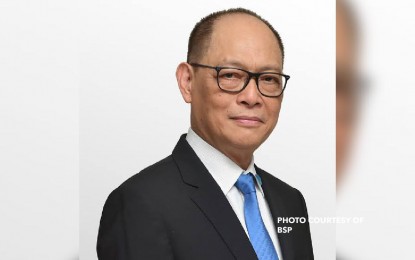
BSP Governor Benjamin Diokno
MANILA – Bangko Sentral ng Pilipinas (BSP) Governor Benjamin Diokno said recovery of the domestic economy and preventing a second wave of the coronavirus disease 2019 (Covid-19) depends largely on the public’s behavior.
“If we can avoid a second wave or a third wave, the forecast will be steady. That means a U-shape recovery but in case there is a second wave, that could mean a W-shape recovery. That will be much worse than the revised forecast,” he said in an interview over ANC on Monday.
The inter-agency Development Budget Coordination Committee (DBCC) has revised its growth target for this year from zero to -0.8 percent to a contraction of between 2 percent to 3.4 percent, as the pandemic poses greater-than-expected impact on the domestic economy especially after the implementation of quarantine in Luzon since March 17, which was followed by other local government units in the Visayas and Mindanao.
For one, Luzon accounts for about 70 percent of the domestic output.
In the first quarter this year, domestic expansion contracted by 0.2 percent, a big turn-around from the 5.6-percent print in the same period last year.
With most parts of the country now placed under general community quarantine (GCQ), except for some like Metro Manila which is under a modified enhanced community quarantine (MECQ) since May 16, and the cities of Cebu and Mandaue that are still under ECQ, Diokno believes this is a “positive development unless there is a deterioration in those hotspots”.
“I think we are ready towards our move for normalization so I am optimistic that the forecast right now of DBCC might hold, unless there is a serious second or third wave,” he said.
Diokno said the 2-percent contraction forecast “is based on the effectiveness and the early deployment of what we have in mind, both fiscal and monetary”.
He added both the central bank and the national government have implemented measures aimed at addressing the economic impact of the pandemic.
“We started from a position of strength,” he said, citing the banking industry, for one, remains well-capitalized and has a high asset quality.
This, Diokno said, makes authorities discount a major problem for the sector vis-à-vis the pandemic.
The focus should be in sectors like tourism and the rice industry, he said.
“That's where we need the Congressional initiative on creation of a special purpose vehicle. After that, we are okay in the banking industry,” he added.
Even with this outlook, Diokno said the BSP is “closely monitoring the banking industry” after credit outlook of some banks have been lowered by Fitch Ratings due to the impact of the pandemic.
“We are going down to individual banks so we are looking at granular data,” he said, citing the industry’s non-performing loan (NPL) ratio remains at around 2 percent, way below the BSP’s 10-percent requirement and the Bank of International Settlements’ (BIS) 8-percent requirement.
Diokno further said they did some stress tests and found out that even with a 5-percent NPL ratio, the whole banking sector “is still sound”.
He said bankruptcy is inevitable for some banks, but the BSP prepared the industry well.
“I think we'll get through with minimal problems unlike during the Asian financial crisis. We're ready for this kind of crisis. That's what we have prepared them for,” he added. (PNA)
